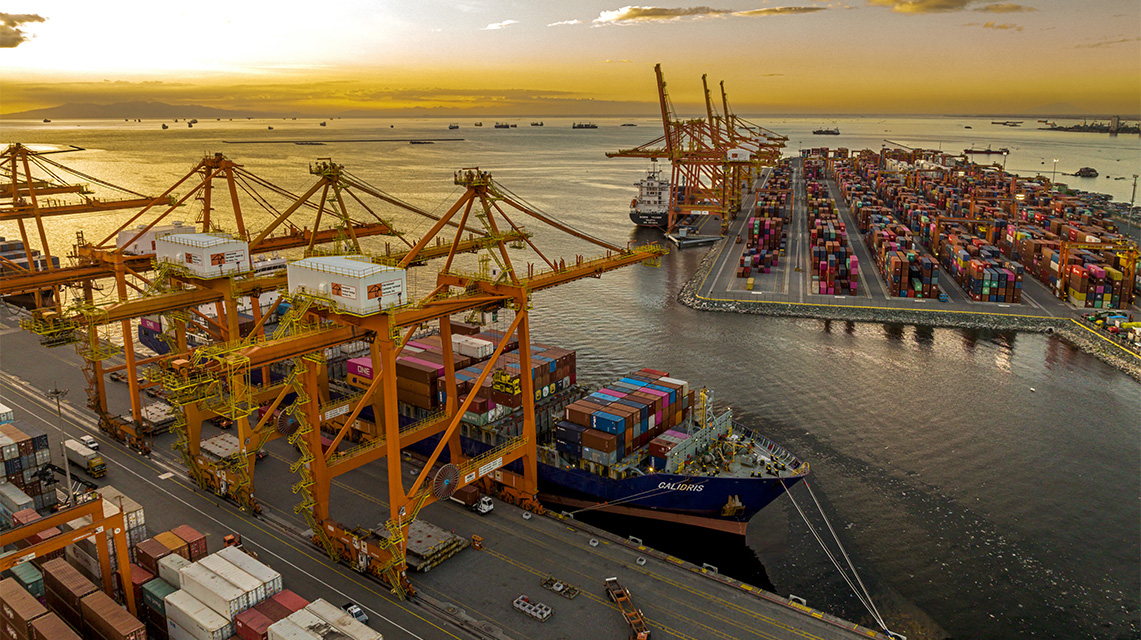International Container Terminal Services, Inc. (ICTSI) has invested more than PhP900 million (USD20 million) in information technology (IT) for its flagship Manila International Container Terminal (MICT) in the last 10 years.

“The hefty investments in technology are meant to crisis-proof the terminal, safeguard shipments and system processes, maximize the efficiency of its operations and maintain ICTSI’s world-class brand of customer service,” says Christian R. Gonzalez, ICTSI executive vice president.
Setting the stage for future technology and digital service deployments at MICT, ICTSI partnered with PLDT last year for the roll out of 5G at the terminal. The MICT is currently utilizing the technology to automatically weigh containers using spreader load cells in rubber tired gantries (RTG). Having this feature helps shorten truck drivers’ stay at the port as they no longer need to queue to use the terminal’s weigh bridges.
5G technology is an important cornerstone of MICT’s journey towards becoming the first smart port in the Philippines. Other 5G-integrated projects in the pipeline include truck driver messaging, remote safety monitoring using intelligent surveillance systems and remote crane monitoring using Internet of Things devices and sensors – all of which are aimed at improving safety and efficiency of port operations while reducing foot traffic inside the terminal.
In 2015, ICTSI launched the Terminal Appointment Booking System (TABS) at MICT to facilitate the seamless flow of cargo in and out of the port. The MICT is currently working on the TABS Manifesting System, which automatically captures container data and truck plate numbers during the booking process. Once the system is deployed, drivers no longer have to input anything in the terminal kiosks upon their arrival.
A new MICT app is also currently under development. The new app is designed to give port users access to several services like Track & Trace across multiple ICTSI terminals, online payment and eventually TABS booking. It will also include features like GPS location and ETA, geofenced gate-in and yard locations for drivers.
With the goal of improving its enterprise resource planning system, ICTSI recently tapped Rimini Street – a leading third-party support provider for Oracle and SAP – to provide support for business-critical functions including financials, treasury, asset tracking and equipment maintenance and repair. The exceptional support and robust platform enables the Company to focus more on addressing emerging market requirements and capitalizing on future market opportunities.
During the height of the COVID-19 pandemic, ICTSI’s investments in technology driven solutions were key to MICT’s uninterrupted operation despite the nationwide lockdowns that threatened the country’s supply chain. As ICTSI moved decisively to safeguard the welfare of employees at MICT by providing COVID vaccines and instituting rigid health protocols and remote work arrangements, these technologies helped keep the terminal functioning and open for business 24/7.
MICT’s online payment system enabled customers to process their transactions without physically going to the terminal. Launched in 2017, the system had a mere 30 percent adoption rate prior to the pandemic. With lockdowns in place and COVID cases ballooning, customers relied on the system as the primary means of payment for their transactions.
“The billing process at MICT was not affected by the lockdowns as customers started using the online payment system. From 30 percent, the system’s adoption rate grew to 100 percent as clients realized they can conveniently and safely transact with us without going to the port,” explained Mr. Gonzalez.
A similar payment system is also currently being developed for NorthPort, Subic Bay International Terminals and Mindanao Container Terminal. The system is scheduled for launch within the year.
Mr. Gonzales adds: “These technologies have been in place at the MICT for quite some time now and have proven to be game-changing, especially during the pandemic. We focused on optimizing these existing systems and accelerated the development of other digitally enabled services to make our terminals more efficient even with limited personnel on site.”
Aside from launching an online payment system, the MICT is gearing up to launch its online examination viewing portal pending approval from the Philippine Department of Agriculture. The portal will enable brokers to observe the Bureau of Customs’ examination of containers without being physically present at the terminal.
For transactions that require a visit to the port like container returns and pull-outs, the MICT has systems in place to limit face-to-face interactions. The terminal gates are automated and have been unmanned since 2015. Instead, optical character recognition, license plate recognition and radio frequency identification technologies facilitate the seamless entry and exit of trucks.
“ICTSI will continue to take advantage of new technologies to push our efficiencies for the benefit of our customers,” concludes Mr. Gonzalez.